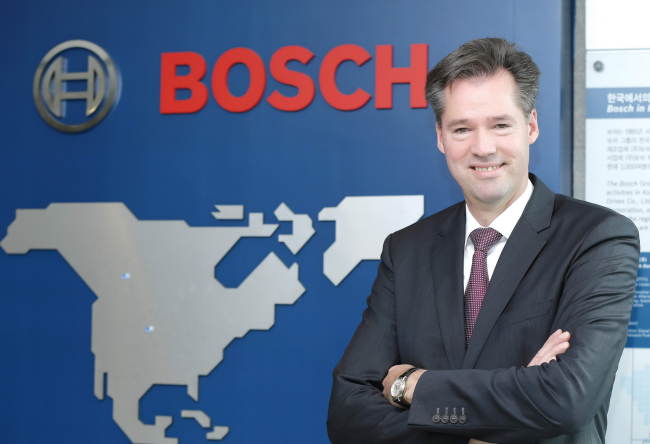Bosch seeks bigger role in Hyundai’s diesel strategy
By Korea HeraldPublished : Feb. 9, 2014 - 19:33
Hyundai Motor may have failed to gain an early edge in the nation’s diesel car market currently dominated by German luxury brands, but it has great potential for reversing the trend, said Markus Heyn, president of Bosch’s diesel systems division.
“Hyundai is now capable of delivering attractive diesel vehicles into the market. And Bosch is here to support the efforts,” he told The Korea Herald on Friday at the Korean headquarters in Yongin, Gyeonggi Province.
“Hyundai is now capable of delivering attractive diesel vehicles into the market. And Bosch is here to support the efforts,” he told The Korea Herald on Friday at the Korean headquarters in Yongin, Gyeonggi Province.

Touted for their torque and fuel economy, diesel-powered vehicles now make up more than half of the foreign-brand cars sold in Korea. Hyundai and its affiliate Kia Motors are also ramping up efforts to strengthen their diesel lineups, providing a boon for diesel parts makers like Bosch.
“Korea has made good progress in customer perception about diesel cars. I also could see many diesel models on the Korean roads,” said the diesel chief of the world’s largest auto parts maker.
Hyundai has yet to include diesel models among its high-end luxury cars such as the Genesis and Equus. Heyn agreed that having diesel-powered luxury cars would be helpful for consolidating the carmaker’s product portfolio.
“Almost 80 to 90 percent of upper-class, luxury vehicles sold in Europe are diesel,” he said. “I believe that the combination of the Genesis with a nice diesel power train would be an attractive package.”
Heyn would say humbly that Bosch is just an OEM to carmakers. But it is the company’s high-pressure fuel injection technology that has transformed the once noisy, dirty diesel cars into the smooth, tidy, powerful machines they are today.
And Hyundai is one of the global carmakers benefiting from the diesel supremacy of Bosch. The two companies are currently also working on a new project to enter the U.S. diesel market together.
“Hyundai is important not just in Korea but also on the global level as the carmaker builds cars globally,” Heyn said. “Having operations in Korea is also crucial for Bosch because most of their key decisions are made on its home turf here.”
Due to its key client Hyundai, Bosch has expanded its presence in Korea, one of the top 10 markets in terms of sales. Its diesel systems plant in Daejeon produces common rail injectors, electronic diesel control units and air flow sensors for Hyundai.
Despite the complaints among foreign manufacturers about the rising labor costs in Korea, Heyn expressed satisfaction with operating the Korean plant, saying its performance is the highest among Bosch’s global production network.
“It’s too easy to say when you have low labor costs that you are generally competitive,” he said. “Labor cost is one of many elements. We believe that local production impacts heavily the speed of how well we can communicate with our customers.”
He also hinted that Bosch was considering a new investment into the diesel systems business in Korea that could be announced by the end of this year. But he declined to elaborate further.
Bosch logged about 1.8 trillion won ($1.7 billion) in Korean sales last year. The automotive sector made up 83 percent with 1.49 trillion won. The company did not specify the sales number for only the diesel business.
By Lee Ji-yoon (jylee@heraldcorp.com)
-
Articles by Korea Herald


![[Exclusive] Korean military set to ban iPhones over 'security' concerns](http://res.heraldm.com/phpwas/restmb_idxmake.php?idx=644&simg=/content/image/2024/04/23/20240423050599_0.jpg&u=20240423183955)




![[Herald Interview] 'Amid aging population, Korea to invite more young professionals from overseas'](http://res.heraldm.com/phpwas/restmb_idxmake.php?idx=644&simg=/content/image/2024/04/24/20240424050844_0.jpg&u=20240424200058)

![[Pressure points] Leggings in public: Fashion statement or social faux pas?](http://res.heraldm.com/phpwas/restmb_idxmake.php?idx=644&simg=/content/image/2024/04/23/20240423050669_0.jpg&u=)









